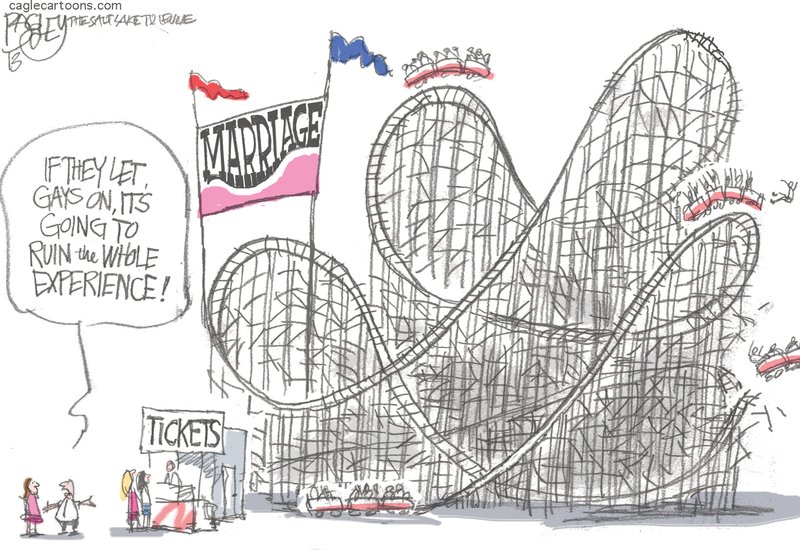Most Americans now accept same-sex marriage. This is a profound shift in a stunningly short time.
Fifty-nine percent support allowing gays and lesbians to marry, according to a Washington Post/ABC News poll released March 4. As recently as the first quarter of 2012, most opposed gay marriage in polls from the same source. In 2003, the numbers on this question were 37 percent support to 55 percent opposition.
Even here, the Arkansas Poll found in October that outright opposition to any legal status for gay couples fell below 50 percent for the first time. That figure stood at 46 percent, down from 54 percent in 2009.
News accounts call the change "generational." That's no explanation. That "reason" begs the question of why this generation is different from every single one before it. It tells us when the world shifted, not why.
I give the "friends and family" effect the most credit. I've seen precious little research to back that up, but I have to think that the greater willingness of gay friends and family to come "out of the closet" -- a term that's obsolete if not archaic by now -- moves mountains.
Saying that your own son or daughter, for instance, should never be allowed to marry someone he or she loves is a harsh thing.
I like the way Robert P. Jones described the effect in a recent issue of the Atlantic magazine. The article says, in part:
"Nearly two thirds of Southerners -- 64 percent -- today say they have a close friend or family member who is gay or lesbian, a factor that strongly influences support for same-sex marriage. Within that group, 56 percent favor allowing gay and lesbian couples to marry legally; among Southerners with no gay or lesbian close friends or family members, only 32 percent favor same-sex marriage.
"These more intimate social connections have moved the debate from the abstract to the personal, to one about the rightness of denying legal recognition for the relationships and commitments of close LGBT friends and family members. For many, if this has not come to seem unjust, it has at least come to feel impolite, a judgment that retains considerable power in the South." "LGBT," of course, stands for lesbian, gay, bisexual and transgender.
Respect for the courts plays a role here, too. Gay marriage advocates won key court cases. A lot of people accept those judgments. The judicial branch may be the last branch of our federal government that commands any such respect. The fussing, fuming and deadlock in the partisan branches has grown so bad, I have to wonder: Perhaps Americans are now more willing than before to let the courts decide things. After all, at least courts can decide things.
Speaking of toxic politics, I also have to wonder how much of this change comes from backlash. I don't think gay marriage was much on the mind of a mainstream, straight American voter before the turn of the century. We inherited our attitudes about it, something we all do more than we admit. This social norm against gay marriage held -- until the issue proved too useful in politics for conservative opponents to leave it alone. It raised too much money and scared up too many votes.
For more than a decade now, stopping gay marriage was presented as a dire reason to vote for this or that candidate. So voters, being conscientious sorts, shook off a legacy of social norms. They looked at the issue afresh and asked: "OK. Is this a reason to support this or that candidate?"
Suppose two people get drunk on the same night in Las Vegas and wake up married. Why should they be eligible for family plan insurance while two other people who have lived faithfully with each other for 30 years aren't? Voters began asking themselves questions like that. Now we have our answer. And nobody's turning into a pillar of salt.
Remember Tinky Winky of the Teletubbies kid's show? He was attacked in February 1999 as a sleeper agent for Gay Pride. I told people in the newsroom then that such paranoia didn't help the opposition. I kept a tiny plastic figurine of the little purple menace at my desk for months thereafter.
Be careful what drums you beat, and how loudly you beat them.
Commentary on 03/30/2014
